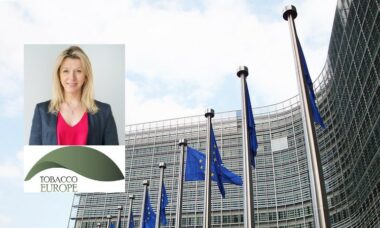 Representatives from the European tobacco industry hope the renewal of the EU Parliament, following elections in June, will bring about changes in the EU Commission (EC)’s attitude towards them, which they perceive as strongly biased.
Representatives from the European tobacco industry hope the renewal of the EU Parliament, following elections in June, will bring about changes in the EU Commission (EC)’s attitude towards them, which they perceive as strongly biased.
Speaking to TobaccoIntelligence, Nathalie Darge (pictured), secretary general and head of EU affairs with Brussels-based industry organisation Tobacco Europe, said EU authorities have so far avoided talking with the sector.
“Since I arrived at Tobacco Europe, I met zero times with DG Sante,” she said, referring to the EC’s Directorate-General for Health and Food Safety, “and I have been there almost seven years.”
“I do hope that the new Commission and the new members of the European Parliament [MEPs] will take this opportunity to just meet us, which doesn’t mean they have to agree with us but just listen to our voices,” Darge continued, pointing out that discussing harm reduction and novel products with tobacco industry representatives would be useful for EU policy-makers.
“They may even have questions,” Darge said, “because actually what they need is data, expertise and economic figures, and this is what we have.”
Not properly involved in the TPD revision process
According to the secretary general of Tobacco Europe – which represents international tobacco giants British American Tobacco (BAT), Japan Tobacco International (JTI) and Imperial Brands, along with a number of national manufacturer associations – the consultation process launched by the EC as part of the revision of the EU tobacco policy framework was also influenced by anti-tobacco biases.
“We have been involved in the consultation formally, but the participation in the formal public consultation is severely limited due to the nature of the process and the fact that the questionnaire limits the participation even further,” Darge said, adding that her organisation took part in the entire evaluation process of the revision of the EU Tobacco Product Directive (TPD) and Tobacco Advertising Directive (TAD).
The activities in which stakeholders were invited to participate by the EC included a call for evidence, a consultation, an interview and a workshop.
“When it comes to the public consultation, questions were extremely difficult to understand,” Darge said, adding that respondents were provided with a list of pre-drafted answers to choose from.
“Some of the responses were completely biased; we could not agree,” she recalls. “As tobacco industry representatives and experts, we have to say we don’t know if any of these questions and answers were fitting with the actual reality.”
When it comes to the rest of the activities, Darge said employment data and concerns from industry associations were not taken into consideration.
“During the entire evaluation process, no questions around employment arose,” she said. “Has the TPD any impact on employment? What is the sort of footprint of the industry? None of that was actually asked, and nothing was considered.”
Protecting public policy from other interests
According to Darge, the lack of dialogue between EU institutions and the tobacco industry is based on a restrictive interpretation of article 5.3 of the World Health Organization Framework Convention on Tobacco Control (WHO FCTC), which requires parties to protect their public health policies from the interests of the tobacco industry.
“The idea that policy-makers dealing with issues related to health policies need to pay attention to any influences that may come from the tobacco industry does not mean they cannot meet us,” she said.
In addition, Darge said she believed some of the consultants hired by the EC to carry out the evaluation process were linked to the activities of anti-tobacco organisations.
When Tobacco Europe flagged what it calls “a potential conflict of interest” in this sense, it didn’t receive a satisfying answer from the EC – which led the organisation to complain to the EU Ombudsman in March.
“We are currently awaiting the Ombudsman’s position on whether they will formally conduct an inquiry towards the Commission and take appropriate action to ensure that the proper measures are put in place to prevent the reiteration of such misconducts,” Darge said.
Prohibition and the black market
While under the impression of not being heard by the EC, Tobacco Europe still tried to push its views across, Darge said, especially when it comes to potential upcoming restrictions to safer alternatives to tobacco smoking.
“These nicotine products are an alternative to smoking; and while they are not harmless, they are less harmful than cigarettes,” she said, “but it seems the Commission has difficulties understanding the concept of harm reduction. Our expectation is for the Commission to actually take on board scientific-based evidence that tobacco harm reduction is not just a concept, it’s a reality, and those new products are really less risky when compared to combustibles or cigarettes.”
Darge said she is worried that a wave of bans targeting flavours in novel tobacco products, such as the one on flavoured heated tobacco products (HTPs) that is being enforced by member states across the EU, will be counterproductive from a harm-reduction perspective.
“Tobacco Europe believes that HTPs – similarly to e-cigarettes, nicotine pouches and other new products – are a gateway away from, not towards, smoking,” she said. “While flavours are a crucial component for smokers and ex-smokers, they convey very little interest from non-smokers.”
At the same time, Darge said, bans push consumers towards the black market, which, in addition to representing a loss for countries’ economies, is less safe for their health.
“The EU market for tobacco and nicotine products is one of the most highly regulated in the world, and combustible tobacco products remain one of – if not the most – restricted category among consumer goods,” she said. “Be it packaging, flavouring or product presentation, further regulations will risk pushing consumers to seek illegal alternatives to pursue their products of choice, despite the legal and societal implications.”
The Finnish case
Darge pointed out Finland’s failed attempt to ban nicotine pouches as an example of the possible outcome of such a prohibition, which is being taken into consideration at a EU level and by some EU member states.
“After the government removed restrictions on marketing that constituted a de-facto ban, and replaced them with more adequate regulations, the Finnish customs have reported a substantial drop in seizures of illegal tobacco oral products,” she said.
“Consumers don’t have incentives to even consider buying illicit products if they are presented with adequate product propositions which are not burdened with excessive restrictions.”
Changing the mindset
Darge said she didn’t expect many changes after the EU Parliament elections, as the tobacco policy framework’s revision process is already well underway and because different political coalitions have proved equally conservative towards tobacco policies.
“In general, if I was not working for the tobacco industry I would say that having a switch towards the right is always good for business,” she said, “but as a tobacco industry representative, I am not sure our lives would change dramatically.”
“I hope, though, that the new MEPs will have a mindset of meeting with legitimate industry,” she added, “and tobacco is part of the legitimate industry.”
– Tiziana Cauli TobaccoIntelligence staff
Photo: Jai79, Nathalie Darge







